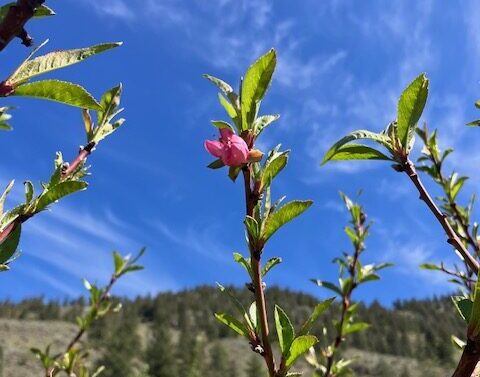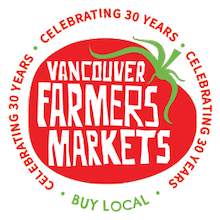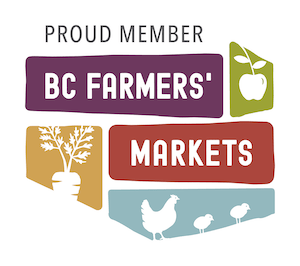An Update on Okanagan Stone Fruit

As some of you may have heard, a bout of warm weather in the Okanagan region this past Winter, followed by a harsh cold snap in January and subsequent Spring frost has had detrimental impacts on the region’s soft fruit trees. As a result, numerous farmers in the Okanagan region are facing near total to total loss of their soft fruit crops.
It’s difficult to imagine a Summer without peaches, nectarines, apricots, and plums at the farmers market, but a good reminder that it is spaces like these direct-to-consumer channels that enable folks like us in Vancouver to best support our local growers and producers in building climate resiliency and sustaining their livelihoods that in turn sustain us and the soil, land, and ecosystems on which we live and breathe.
Some Updates:
We understand that some of our shoppers have questions about how the farmers market is handling this year’s stone fruit shortage. Thank you to everyone who reached out directly to seek clarification – your engagement helps us provide better information and transparency.
Here’s what we have to share:
Regardless of the challenges faced by Okanagan fruit trees or any other products this season, vendors at Vancouver Farmers Markets (VFM) are only allowed to sell items they make, bake, grow, catch, raise, or wild-harvest themselves. Reselling items not produced by the vendor is strictly prohibited.
This policy is unwavering and applies to all markets under the BC Farmers Market Association (BCAFM).
As a proud member of the BCAFM, VFM works diligently to ensure the authenticity and transparency of its markets and vendors. Here are some key points to reassure our shoppers:
- Exclusivity of Products: VFM’s 9 neighborhood farmers markets feature vendors who exclusively sell products they have personally made, baked, grown, caught, or raised.
- No Reselling Policy: Reselling wholesale products is not permitted at VFM markets.
- Strict Enforcement: VFM’s professional staff take product reselling very seriously. They follow up on legitimate complaints and conduct farm visits as necessary.
We encourage you to engage directly with the farmers who grow your food and raise any concerns with our market staff. Ensuring consumer awareness, product integrity, and transparency remains at the core of VFM’s values.
Those Impacted:
We continue to share updates from our vendor community who are impacted by this weather event.
Mythology Vineyard
Mythology Vineyard suffered a big loss of the wine grape crop in Okanagan by the devastating cold snap. Despite the challenges, they’re fortunate to have a decent amount of bottled inventory this year to help weather this storm. They are also adopting a resiliency strategy by diversifying their production by making spirits using juice from other fruits, such as apples, to create brandy, vodka, and gin. Additionally, they have eight mature walnut trees on their property, and they are producing a walnut liqueur—a true farm-to-table story!
Klippers Organics
Klippers Organics has faced significant losses due to this year’s extreme weather conditions. They lost their entire crops of peaches, apricots, and nectarines, and their cherry harvest is drastically reduced from the usual 5,000 lbs to just 50 lbs. Specialty plums such as shiro, elephant heart, and Santa Rosa are entirely wiped out, though there will be a lighter crop of Italian prune plums and pears. Apples fared better, but expect some hail damage. This situation arose after a warm spell in January tricked the trees into budding early, followed by a harsh -30°C freeze that killed the buds. A light frost in May further affected crop yields, and a hailstorm added to the damage.
Snowy Mountain Farm
We are very sad to share that our community’s own Snowy Mountain Farm, who many of you know as a treasured member of the Farm Circle Collective, will not have fruit to bring to the markets this Summer season. You can still expect to see the rest of the collective attending the market to sell their produce. You will also find Aaron and Carly in attendance under their vineyard, Scout Vineyard, selling their impeccably crafted natural wines.
Update: Aaron and Carly from Snowy Mountain Farm faced a complete loss of their soft fruit crops due to a harsh winter freeze. Recently, they experienced another setback when a fire destroyed their cooler buildings, along with all of their farm and market equipment. This disaster compounds an already challenging year for them.
Their family members have started a GoFundMe campaign to help them recover. Please share this news and contribute whatever you can to support them.
Golden West Nurseries
Golden West Nurseries will be coming to the West End, Kitsilano, and Trout Lake markets with their cherries, but unfortunately has reported 100% damage to their peach crop.
Forbidden Fruit Winery
Forbidden Fruit Winery has also experienced a devastating loss of their crop, but will be in attendance at the market with their wines this Summer.
We are working to put together a full list of our vendors that are experiencing damage/loss – keep an eye on our newsletter and website for updates.
A Statement
The BC Association of Farmers Markets (BCAFM) reached out to the BC Fruit Growers Association and received this statement to share:
Following a fairly mild winter in the Okanagan, with temperatures of +10 degrees Celsius, the sudden cold snap in January that reached -25 degrees Celsius was detrimental to many orchards. The Okanagan was also hit with a frost in the Spring, which further killed many of the surviving buds.
Soft fruit (peaches, nectarines, apricots, and plums) have been hit the hardest. In most orchards, we’re seeing 90-100% loss consistently across the Okanagan valley. Unfortunately, consumers should expect to see no BC soft fruit this year from the Okanagan region.
The damage to cherries varies from orchard to orchard. Some Okanagan growers are reporting very little damage, many reporting some crop loss, and others total loss – it is a very wide spectrum of damage. Consumers can expect some BC Okanagan cherries this year, especially in certain pockets that were not hit as hard.
It is still early to guess what this year’s crop will look like for apples and pears. However, both apples and pears are hardier than the other tree fruits, and we do expect a crop – with reserved hope for a normal crop.
We hope consumers will make an extra effort to support BC growers when they can this year and next.
This will be a hard year, both for the consumer missing out on BC soft fruit, and especially the growers who still need to tend to their orchards without the returns from selling fruit. Growers need our support now more than ever, so we hope consumers will still look for and choose BC options when available.
Stay Tuned for Updates
We will keep our community updated via our newsletters and social media if we receive any modes of supporting those vendors in our community who have been impacted by this unfortunate climate event. For now, please visit the markets and meet our vendors to share your support.
Thank you for your continued support of our farmers markets and local growers/producers. Together, we can navigate these challenges and continue to celebrate the bounty of our local agriculture.




